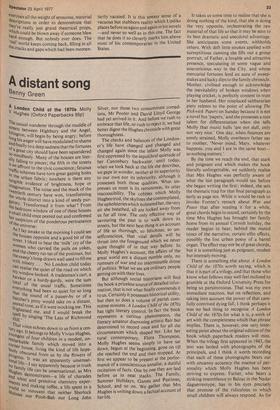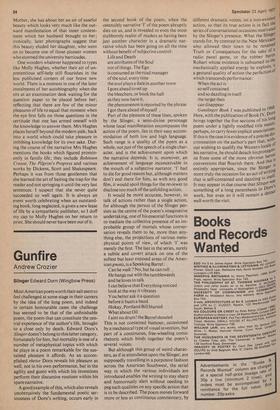A distant song
Benny Green
A London Child of the 18709 Molly V. Hughes (Oxford Paperbacks 95p)
The casual wanderer through the muddle of streets between Highbury and the Angel, Islington, will begin by being angry; before long his anger will have modulated to shame alt,,d finally to a deep sadness that the fortunes °I a great city should have been squandered so mindlessly. Many of the houses are literIlY falling to pieces; the filth in the streets is an affront to the civic conscience; fatuous traffic schemes have torn great gaping holes 1,4 the urban fabric; nowhere is there any !angible evidence of brightness, hope or ,1111agination. The noise and the muck of the `wentieth century have won, transforming the whole district into a kind of seedy puratorY. Transformed it from what ? From the bedroom window of one or these houses aL sinall child once peered out and confirmed her suspicion of the ponderous permanence Of the universe:
As
lay awake in the morning I could see the houses opposite and a good bit of the street. I liked to hear the 'milk' cry of the women who carried the pails on yokes, and the cheery rat-tat of the postman, but t sweep's long-drawn wail used to fill me With Misery . . . No London child today Can realise the quiet of the road on which my window looked. A tradesman's cart, a hawker or a hurdy-gurdy, were the sum total of the usual traffic. Sometimes everything had been so quiet for so long that the sound of a passer-by or of a butcher's pony would take on a distant, unreal tone, as if it were mocking me. This frightened me, and I would break the sriell by singing 'The Lass of Richmond
, That voice echoes down to us from a cen
.lurY ago. It belongs to Molly Vivian Hughes, 3:°1ingest of four children in a modest, un remarkablee remarkable family which moved into a korner house, living the kind of life hopesslY obscured from us by the flowers of pr joegress. It was an apparently unsensat n life—I say apparently because in truth family life can be unsensational, as Mrs ag_Lighes demonstrates —a life of charades :_nrd Whist and primitive chemistry experLWErients and making toffee, a life spent in a Holmes so innocent that neither Sherlock tiolmes nor Pooh-Bah nor Long John
Silver, nor those two consummate comedians, Mr Pooter and David Lloyd George had yet arrived in it. And before we rush to embrace that life, or rush to reject it, we had better digest the Hughes chronicle with great thoroughness. The checks and balances of the Londoner's life have changed and changed and changed again since the infant Molly was first oppressed by the sepulchral quietude of her Canonbury backwater, until today, when we look back at the life she describes, we gape in wonder, neither at its superiority to our own nor its inferiority, although it possesses both those qualities. What impresses us most is its remoteness, its utter inaccessibility. The cobbles which Molly Hughes trod, the skylines she contemplated, the upholsteries which bolstered her, the very air she breathed, all are locked away from us for all time. The only effective way of savouring the past is to walk down its streets, but the next best thing is an account of life so thorough, so felicitous, so unselfconscious, that vital details will be thrust into the foreground which we never quite thought of in that way before. In Molly Hughes's account, the affairs of the great world are a distant rumble only, no rumours of war and no interminable drone of politics. What we see are ordinary people getting on with their lives.
But although social historians will find the book a priceless source of detailed information, that is not what finally commends it to us. Certainly it Possesses historical utility, but then so does a volume of parish committee minutes. A London Child of the 1870s has tight literary control. In fact the book represents a curious phenomenon, the literary amateur disowning artistic flair but determined to record once and for all the circumstances which shaped her. Like her rural contemporary, Flora Thompson, Molly Hughes seems simply to have sat down, begun at the beginning, gone on till she reached the end and then stopped. At first we appear to be present at the performance of a conscientious annalist, a dutiful recitation of facts. One by one they are laid before us in neat stacks. The Family, Summer Holidays, Games and Pastimes, School, and so on. We gather that Mrs Hughes is writing down a factual account of her life.
It takes us some time to realise that she is doing nothing of the kind, that she is doing the very opposite, orchestrating the raw material of that life so that it may be seen to its best dramatic and anecdotal advantage. She anticipates some events, withholds others. With deft little strokes applied with surreptitious cunning she fills out a group portrait, of Father, a lovable and attractive presence, speculating in some vague and unavaricious way in the City, and whose mercurial fortunes lend an aura of sweepstakes and lucky dips to the family chronicle. Mother, civilised enough to acknowledge the inevitability of broken windows when playing cricket, is perfectly content to trust in her husband. Her misplaced sabbatarian piety relents to the point of allowing The Pickwick Papers on Sunday because it is not a novel but 'papers,' and she possesses a nice talent for differentiation when she tells Molly that music halls 'are not dull, only not very nice.' One day, when finances are sorely strained, Molly overhears father say to mother, 'Never mind, Mary, whatever happens, you and I are in the same boat— so nothing matters.'
By the time we reach the end, that stark and poignant end which makes the book literally unforgettable, we suddenly realise that rvIss Hughes was perfectly aware of what the last paragraph would say before she began writing the first; indeed, she sets the thematic trap for that final paragraph as early as page ten. While it would be rash to invoke Forster's remark about War and Peace that after reading it for a while, great chords begin to sound, certainly by the time Mrs Hughes has brought her family home from its annual Cornish holiday, the reader begins to hear, behind the muted tones of the narrative, .certain elfin effects, possibly the lost urban poesy of a barrel organ. The effect may not be of great chords, but it is something just as poignant, modest but intensely moving.
There is something else about A London Child of the 1870s worth saying, which is that it is part of a trilogy, and that those who know what follows may well feel inclined to grumble at the Oxford University Press for being so parsimonious. That was my own immediate reaction, but on reflection, and taking into account the power of that carefully contrived dying fall, I think perhaps it was no bad thing to recognise A London Child of the 1870s for what it is, a work of art with the completeness which that phrase implies. There is, however, one very interesting point about the original edition of the book which paperback readers will miss. When the trilogy first appeared in 1943, the text was larded with photographs of the principals, and I think it worth recording that each of these photographs bears out with uncanny accuracy the essence of personality which Molly Hughes has been striving to express. Father, who bears a striking resemblance to Balzac in the Nadar daguerreotype, has in his eyes precisely that promise of the ridiculous to which small children will always respond. As for Mother, she has about her an air of easeful beauty which looks very much like the outward manifestation of that inner contentment which her husband brought to her; ironically, later photographs suggest that this beauty eluded her daughter, who went on to become one of those pioneer women who stormed the university barricades.
One wonders whatever happened to types like Molly Hughes, whether their air of unpretentious self-help still flourishes in the less publicised corners of our brave new world. There is a moment in one of the later instalments of her autobiography when she sits at an examination desk waiting for the question paper to be placed before her; reflecting that there are few of the minor pleasures of life to equal that moment when the eye first falls on those questions in the certitude that one has armed oneself with the knowledge to answer them. Mrs Hughes places herself beyond the modern pale, back into a world which could take pleasure in imbibing knowledge for its own sake. During the course of the narrative Mrs Hughes mentions the books which figured prominently in family life; they include Robinson Crusoe, The Pilgrim's Progress and various works by Dickens, Scott and Shakespeare. Perhaps it was from those gentlemen that she learned the art of baiting the trap for the reader and not springing it until the very last sentences. I suspect that she never quite succeeded so well again. It is always an event worth celebrating when an outstanding book, long neglected, is given a new lease of life by a sympathetic publisher, so I doff my cap to Molly Hughes on her return to print. She should never have been out of it.



































 Previous page
Previous page